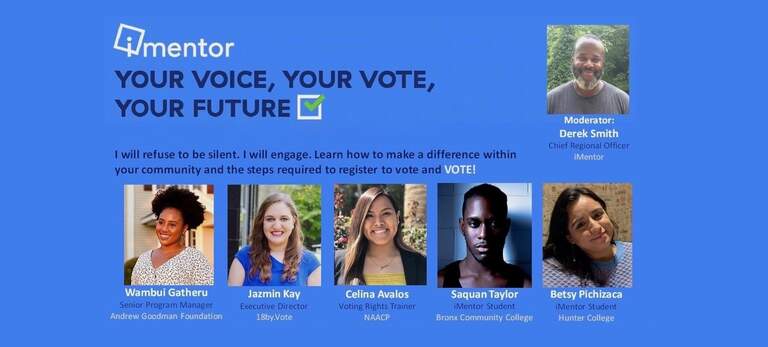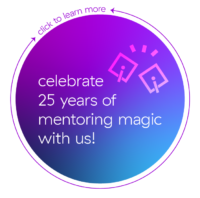For many high school and college students, this November will be their first chance to vote in a federal election. At “Your Voice, Your Vote, Your Future,” iMentor’s recent virtual event focused on voter registration, a panel of iMentor college students and voting rights activists spoke with Chief Regional Officer Derek Smith and with the iMentor community about their own experiences at the polls, civic engagement, and the importance of exercising their voices in a democracy.
The Youngest Voters Speak Out
More racially and ethnically diverse than previous generations, Gen Z will account for one in 10 eligible voters this election and could have an impact on the results in November’s presidential election.
“For me, coming from an immigrant community, it is worthwhile to go to your voting booth if you're not able to vote through mail,” said Betsy Pichizaca, an iMentor student who plans to vote for the first time in a general election this year. “Do as much as you possibly can to get your vote and your voice counted, especially because whatever you vote for would definitely directly impact not only you, but future generations.”
Betsy shared that her family often discussed politics at the dinner table. “My parents really ingrained in both my brother and me that we had to learn about politics and about the government in this country early on,” said Betsy, who is studying political science, English, and sociology at Hunter College in New York. “That knowledge was going to empower us and then help us empower other people in our community.”
“Voting for me is important, but what is really important is after we vote,” said Saquan Taylor, an iMentor NYC student at Bronx Community College. “The action after that is what's important. If we don't get our votes, our voices heard, what's next? So vote and know your candidates, know yourself and what you stand for.”
Growing up in a rural community drove Jazmin Kay, a recent George Washington University graduate, to want to be part of the civic process. “I saw around me that a lot of the young people cared, but we didn't know how to translate that into this idea of you have to be voting and you have to be civically involved,” she said.
Jazmin went on to establish an organization called 18by.vote that aims to help teens understand how, when, and why to vote. The organization’s mission is rooted in the idea that young voters are more likely to become lifelong voters. “For me and a lot of young people, it's a crazy year. You're maybe graduating or figuring out your next steps, and there's just so many things going on that voting is sometimes not at the top of your minds,” said Jazmin. “So we really work to make sure that we're working with 16-, 17- year-olds to have these conversations earlier.”
“Before an election year, everyone gets really revved up and it's all about the vote. But voting shouldn't be a transaction. It should be a transformation,” said Jazmin. “If you care about these issues, if you care about your community, this is a habit that you are investing in. To talk about that, you have to understand the history. You have to understand who originally could vote—only white men who owned property—and what does that system exclude and why, and why is it so important that we make sure that we have fought for this right.”
How Teens Can Have an Impact
Even though they can’t vote yet, youth who are younger than 18 can also play a role in the political process, said Wambui Gatheru, senior program manager of movement strategy at the Andrew Goodman Foundation.
“All of the 16-year-olds, 17-year-olds who think, ‘ I can't register to vote. I can't do anything.’ Actually, you registering to vote is super important,” said Wambui. “It lets the state know that people your age are interested in voting. So that will also change how the people that are running for office talk to you. They're going to be like, ‘Maybe we should go visit high schools and talk to what young people are thinking about.”
The most recent midterm elections saw the highest turnout for millennial voters in a long time, noted Wambui. Local elections, such as those for city mayor or city council, are not as exciting as a presidential election, she said, but they determine important outcomes like funding for schools or sentencing guidelines for nonviolent offenses. She urged teens to get involved. “Start researching who is running for office, because it matters,” she said.
Participating in public service also isn’t restricted to either voting or running for office, said Jazmin. She pointed to municipal police task forces that are required to include youth perspectives as a way that students can get involved. Students can also work for change within their schools, she said.
“There's no one linear path when it comes to making a change in your community. Realize that you have your own path and you are already doing more public service than you realize,” said Jazmin. She urged iMentor students to focus on talking to individuals in their communities about how to create change.
Voter Suppression on the Rise
Voter disenfranchisement is a concern for voters of color throughout the U.S., explained Celina Avalos, a voting rights trainer with the NAACP Legal Defense and Educational Fund. Voters of color may be forced to wait on long lines to cast their ballot on Election Day, perhaps because their state has too few polling sites. Polls may close early, which means fewer people are able to vote. Accessing forms for voting by mail may require that a voter has a printer or an Internet connection.
President Lyndon B. Johnson signed into law the Voting Rights Act of 1965, which made illegal many of the discriminatory practices adopted by many Southern states to disenfranchise voters of color. But in 2013 the Supreme Court struck down key parts of the Voting Rights Act. As a result, “states that previously had a history of voter suppression are using the same tactics again to suppress the Black and brown vote,” said Celina.
Voting for Our Communities of Color
Elections are a key way of participating in our democracy and ensuring that this democracy reflects our communities and our values. “Our entire nation has been built upon our backs and yet our voices have not been a part of the conversation,” said Wambui, addressing the students of color at the virtual event. “There are so many people who quite literally put their lives on the line so that we could have the opportunity [to vote.] Voting is for you. It's for your aunts, it’s for your uncles, it’s for your children. It’s for everybody.”
And if your candidate does not win?
“See what else they're going to do. See if they're going to run for a smaller office,” said Wambui. “See the person currently in office. You didn't like what they'd had to say. OK. Now tell them what you would prefer them to do now that they have that privilege.”
“You have the opportunity to take away and give power.”

